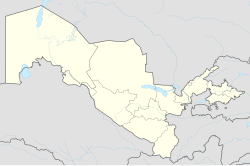Mo‘ynoq
|
Mo‘ynoq Uzbek: Mo‘ynoq / Мўйноқ Karakalpak: Moynaq / Мойнақ |
|
|---|---|

The entrance of Mo‘ynoq
|
|
| Location in Uzbekistan | |
| Coordinates: 43°46′N 59°02′E / 43.767°N 59.033°ECoordinates: 43°46′N 59°02′E / 43.767°N 59.033°E | |
| Country |
|
| Autonomous Republic | Karakalpakstan |
| District | Mo‘ynoq District |
| Elevation | 55 m (180 ft) |
| Population (2012) | |
| • Total | 18 196 |
Mo‘ynoq, also spelled as Muynak and Moynaq (Uzbek: Mo‘ynoq / Мўйноқ; Karakalpak: Moynaq / Мойнақ; Russian: Муйнак/Muynak), is a city in northern Karakalpakstan in western Uzbekistan. Formerly a sea port, now home to only a few thousand residents at most, Mo‘ynoq's population has been declining precipitously since the 1980s due to the recession of the Aral Sea.
Once a bustling fishing community and Uzbekistan's only port city with tens of thousands of residents, Mo‘ynoq is now dozens of kilometers from the rapidly receding shoreline of the Aral Sea. Fishing had always been part of the economy of the region, and Mo‘ynoq became a center of industrial fishing and canning. However, a 1960s Soviet government diversion of the Amu-Darya and Syr-Darya rivers, sapped the sea of its inflows, leaving the area very susceptible to economic collapse, causing the Aral Sea to severely dry up. The regional Soviet-led agricultural monoculture dominated by cotton production diverted water from the aforementioned tributary rivers of the sea into irrigation, which resulted in severe pollution caused by agricultural chemical runoff, causing the sea to evaporate and leaving the water with extremely high levels of salinity making it very toxic, causing the ecological disaster which is destroying the sea and killing the residents of the towns in its vicinity, including Mo‘ynoq.
Mo‘ynoq's major attractions are the armada of rusting hulks that once made up its fishing fleet during the Soviet era, and a one-room museum devoted to Mo‘ynoq's heritage as a center of the fishing industry. Poisonous dust storms kicked up by strong winds across the dried and polluted seabed give rise to a multitude of chronic and acute illnesses among the few residents who have chosen to remain, most of them ethnic Karakalpaks, and weather unmoderated by the sea now buffets the town with hotter-than-normal summers and colder-than-normal winters.
...
Wikipedia

